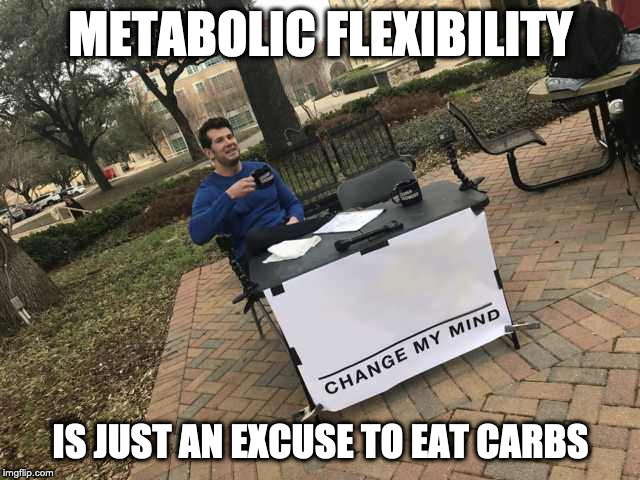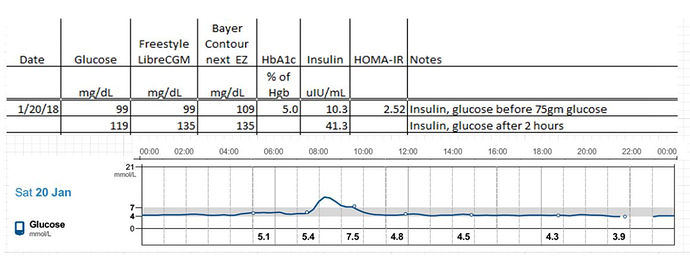Why wouldn’t you be? We do we (me in the past) think it’s normal or OK to have a complete adverse reaction to eating a “normal” meal? If keto make us and our metabolisms so healthy why can the majority of the population eat a small plate of pasta and be fine, yet me of the past would eat it and feel like I got hit by a truck, brain fog for days, bloating etc? It’s a complete over reaction so something that shouldn’t cause that. No different IMO to becoming insulin resistant. The body isn’t working right, I want everything to work and behave. If I eat a ton of fat I want my body to burn it and act correctly. If I want to eat more carbs I want my body to burn them and act correctly. Not a self created hyper sensitivity to normal foods. Not possibly being a keto meal is besides the point.
Paul Saladino + "metabolic inflexibility" (+rise in morning BS?)
I think we are all just in one big dietary experiment to which we will not know the outcome for another 30 years.
We KNOW what happens to the general population from eating pufas and sugar thanks to the dietary recommendations of the past fifty years plus.
And yes, we can believe our early ancestors ate a mostly meat based diet, but we certainly don’t know what their blood sugar, cholesterol, and triglycerides were like. There is almost no (or maybe even just no) data on how health markers should look for low carb people over the very long term. I don’t think researchers truly know what they should be. If keto truly is close to the true human diet, maybe slightly higher morning blood glucose is fine as long as A1C is low?
Also, our bodies learned to adapt to a fat metabolism, but it took several weeks. Why wouldn’t the body be able to revert to sugar burning? Why would we expect that to happen over night instead of over several weeks just like the change over to fat burning?
I totally disagree with this. You give the example of pasta. I ate a Pritikin-style diet for decades, and pasta was a thing I ate every freaking day. Pasta is one of the worst things a person can eat. I saw my Dad get put into T2D because he had to had pasta every day. I saw may Dad die of prostate cancer, because he filled himself with the POISON that is pasta.
A normal meal is not pasta. Let me repeat that. A normal meal is not pasta.
Since I never took data before I went low carb, I cannot say what my reaction to a “normal” meal was then and cannot say how it has changed over time.
I do know that I have taken and PASSED a 2-hour Kraft test WHILE BEING IN KETOSIS, after 5.5 years low carb.
And if I eat pasta once in a blue moon while being keto, why do I care what my response is? In the last SEVEN years, I have eaten pasta less than 5 times, and several of those when were I had no choice (a wedding, funeral, etc.). And I ate past every freaking day, sometimes twice a day for DECADES. I don’t need pasta. I don’t want pasta.
And his whole (Saladino’s) premise is that “carbs don’t cause insulin resistance”, and he gives the example of him eating raw honey twice a day. Huh? In what way does that prove his hypothesis?
What does that mean? We don’t just suddenly stop being able to metabolise glucose, for Heaven’s sake! Has Peter posted anything on his blog about this? I’d love to know his take.
You’d have to listen to the podcast. Let’s just say that sometimes he comes across as not making complete sense (other than the person who started getting higher morning blood glucose readings…that is troubling even for me).
That would be my supposition. Sometimes it can be a problem having too much information, especially when we don’t know what to do with it. I’d love it if there were an experiment done on keto with seed oils as the fat, vs. keto with solid fats and PUFA’s under 1.0%, as Dr. Chris Knobbe recommends. It would certainly be interesting to see the results.
I doubt that, because glucose metabolism is something every cell knows how to do. Even muscle cells that have re-learned how to rely on fatty-acid metabolism for their endurance performance still have to rely on glycolysis for their explosive performance, so the glycolytic pathway never gets deactivated. Glycolysis can occur anywhere in the cell, although it can and does happen in the mitochondria. Fatty-acid metabolism can happen only in the mitochondria, and the damage caused by AGE’s and ROS’s (from too much glucose in the diet) hampers their ability to metabolise fatty acids. The time it takes for mitochondrial healing to occur is one of the reasons for the period of fat-adaptation.
Stop over reacting, I used pasta as an example because it’s carb-y. I’m sorry about your dad but you’re not going to tell anybody your father got T2D or died BECAUSE of pasta. You’re clearly beyond biased on this because of what happened to him.
It seems to me that bloating, gas, indigestion, heartburn, constipation, etc. are all considered fairly normal for people who eat the SAD. Spicy food? Here, take this heartburn medicine. Acid reflux? Here, lower your stomach acid with a proton pump inhibitor (I think that’s the term for those meds.) Gas? Take some Gas X.
How many people, particularly by the time they get to middle age, have to take these over the counter meds (or prescription) for these maladies that are considered benign? Oh, everyone has _______ sometimes.
Now, how many of us have these problems on keto? I bet the incidence is WAY lower. The people who think they can eat high carb may think they can, but maybe they get some of those above listed maladies and think it’s normal.
I don’t understand this remark. Pasta is pure carbohydrate. Carbohydrate in excess causes insulin resistance and ultimately Type II diabetes. I’m very lucky I escaped a diagnosis of Type II myself, though in retrospect, I clearly had what Dr. Joseph Kraft called “occult diabetes” or diabetes in situ.
I think you’re right. I can increase my carb intake somewhat and, while still remaining in ketosis, begin to feel all the aches and pains that eventually left me when I was ketogenic long enough. I sometimes marvel at what I thought was normal, that actually wasn’t.
I said the following here:
Several frequent posters to this forum continually talk about consuming carbohydrates to gain and/or maintain so-called ‘metabolic flexibility’. A few others bring it up occasionally. All these posters talk about ‘metabolic flexibility’ as something desirable and healthy. So what exactly are these people talking about?
From what I can determine from their posts, to all these folks ‘metabolic flexibility’ means eating carbohydrates for the purpose of - eating carbohydrates. In other words, they are using the term ‘metabolic flexibility’ to justify eating carbohydrates.
Now, I stand to be corrected if I am interpreting this incorrectly. And I started this topic to give these folks the opportunity to correct me.
My understanding of so-called ‘metabolic flexibility’ is this. When glucose levels are low, especially over time, most cells will switch to using fatty acids and/or ketones for fuel. Ketones allow cells to be metabolically flexible . Eating carbohydrates not so much. Since gluconeogenesis synthesizes all the glucose we need for those cells and organs that can’t utilize fatty acids and/or ketones there is zero need to eat carbohydrates, which are simply sugar molecules of various descriptions.
Eating carbs is not metabolic flexibility. This is a huge misunderstanding. As @PaulL said above, we never lose our ability to utilize carbs/glucose. Gluconeogenesis ensures that, since the brain and various other cells require some glucose. Real metabolic flexibility is the ability to utilize ketones and fatty acids efficiently in all cells that do not absolutely require glucose. Eating sugar (ie carbs) blocks metabolic flexibility, since it interferes with lipolysis and fatty acid metabolism. The more carbs you eat, the more it interferes. So don’t claim you eat pasta, or whatever, to ensure metabolic flexibility, because I don’t think so. You’re eating pasta, or whatever, simply because you want to eat it. If you have to justify it to yourself, that’s your problem. And, yes, I think Paul Saladino is doing this, too.

Hey, if someone can eat carbs, why not? Dr. Phinney estimates (guesses) in one of his lectures that possibly as much as 20% of the population can handle the carb load of the standard American diet with no trouble. But for those of us who can’t . . . thank God there’s bacon! 

His purpose wasn’t metabolic flexibility; it was health. He was having trouble with just meat (and fat) and so played around with carbs until he found his own balance. His CGM readings are terrific and I think most folks would be delighted to have his numbers.
Speaking for myself alone, I got into a lot of trouble eating glucose and fructose, the latter being a great part of my sugar addiction. I certainly don’t need any fructose in my life, and eating as little of glucose as I can manage is also a great help. One hundred grams of honey contains 82.4 g of carbohydrate, all but 0.3 g of it sugar.
Yes, it’s a carb, and carbs do what carbs do, but claiming Pasta as a THE cause for T2D and death is insane. No shortage of people eat way worse than that and live very long lives. He has zero proof that pasta itself did either of those. I don’t think it takes a crystal ball to know that he (like many of us) had a whole list of unhealthy things going on. 1 or 2 servings of Pasta isn’t doing either of those, I don’t care if it’s every day of the week. Should somebody eat pasta every day of the week? Of course not, but to pretend it’s THAT bad is a crazy stretch to say the least. What else went with all that Pasta? If it was me from 10yrs ago it would have been cookies, a desert, couple donuts first thing in the morning with my large iced coffee loaded with sugar, couple more coffees throughout the day also loaded with sugar. Chips with my sandwich etc. It’s never one thing.
Yes, of course - this is true for many people. Honey is not a general recommendation from him; it’s just what works for him personally. I think he ends up with something like 120g of carbs from it/day but is still in ketosis much of the time.
He talks about it in some podcasts. From what I remember, it was clearly electrolyte related (muscle cramps, heart palpitations) but he couldn’t find a balance no matter how he supplemented, so basically the carbs help him hold onto sodium.
I’ve wondered about this a lot over the years. If physiological insulin resistance is normal and even desirable, what about the area under the glucose curve? I would think that it’s best, healthiest for our cells, to keep that on the lower side.
Right now Saladino’s CGM shows fasting levels around 70 and then a brief rise after meals. Many folks in the Keto community have fasting levels around 95 or 100. Maybe it stays even all day, but that still means a larger overall glucose exposure for our cells.
(I realize this is incredibly oversimplified…)
I’ll use myself as an example of a fairly normal, metabolically speaking, individual. As demonstrated in my CGI experiment overall glucose remains within the ‘normal’ range and variation in overall concentration is quite minor when in sustained ketosis. In my case, the range was mid-low normal. If you look at my daily glucose plots it would be very difficult to determine when I ate meals or changed activity intensity. I think this is what one could expect with any relatively healthy, metabolically normal person. I think you could logically conclude that metabolic (or other) disfunction would raise the concentration and lead to greater variability.
I’ll conjecture that from an evolutionary perspective, ie our Pleistocene ancestors spent most of their lives in ketosis with only minor and short excursions out of it depending on seasonal availability of a very few edible carb food sources, a relatively simple control mechanism worked fine. Maintaining a stable baseline of glucose for those cells/organs that require some utilizing primarily insulin as the control mechanism worked. It was not until our Holocene ancestors started domesticating carb sources that the glucose/insulin mechanism became overwhelmed by a glut of glucose caused by eating carbs.
I’ve eaten high carb / near zero fat years ago for a summer… fruit based and never had issues of insulin resistance. I actually felt the glucose from ripe stone fruits being absorbed by my cells after physical activity. Then ketogenic… high fat / very low carb.
Issues always occured when mixing the two macronutrients beyond a certain threshold.
I also wouldn’t equate fruit with the damaging effects of grains/refined sugar if we’re insulin sensitive… Like after physical activity.

